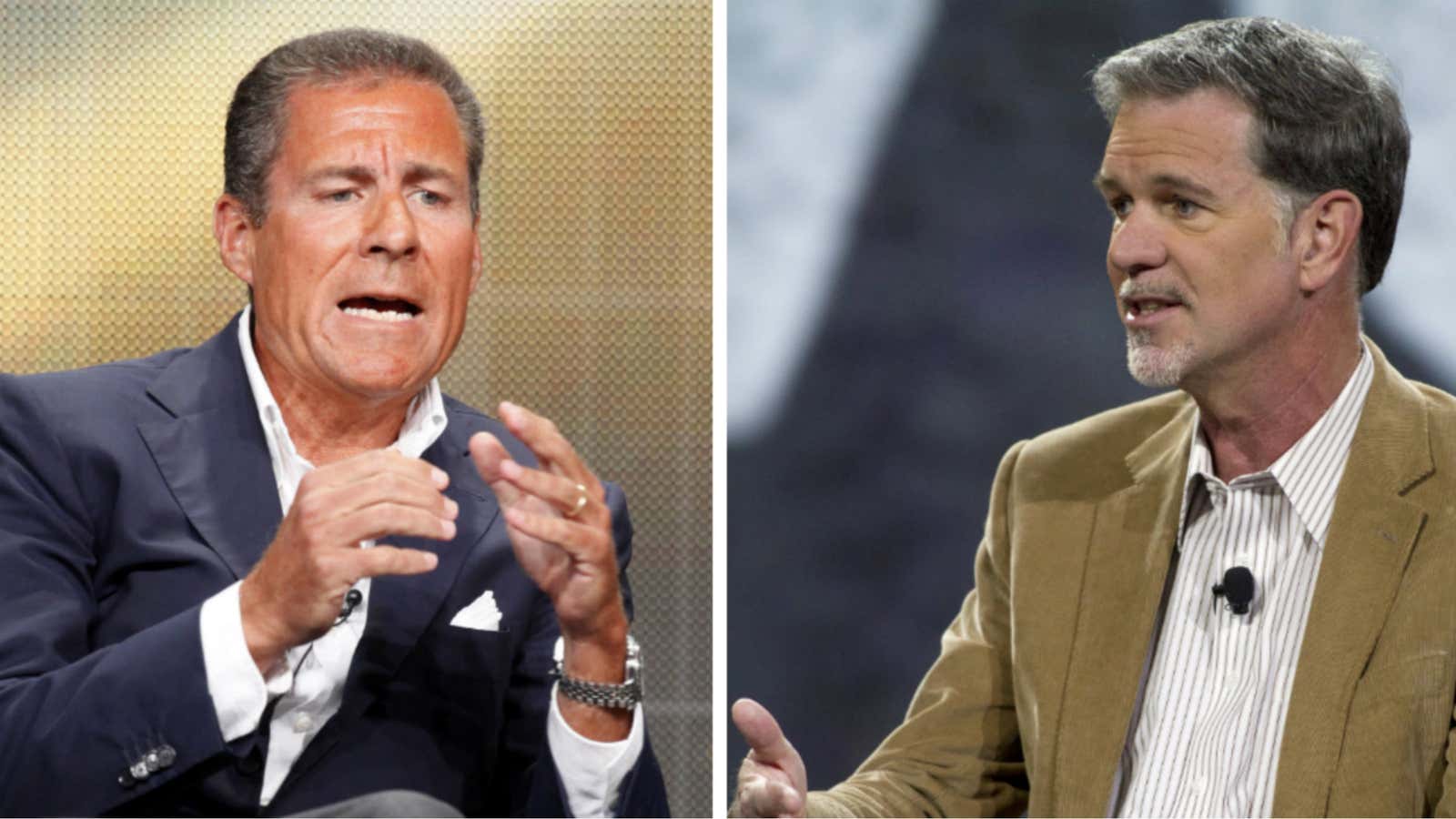It will surely go down as one of the great CEO quotes of 2014. Netflix’s visionary CEO, Reed Hastings, was asked about his counterpart at HBO, Richard Plepler, who had recently said he was not concerned about people sharing passwords for HBO’s online service, HBO Go.
“So I guess Plepler, the CEO of HBO, doesn’t mind me sharing his account information. So it’s Plepler@hbo.com and his password is Netflixbitch” remarked Hastings.
The apparent tension between Netflix and HBO, the two iconic companies behind some of America’s most loved shows (and Americans do love their television) has captivated the media, ourselves included. It’s not difficult to understand why. In many ways, it symbolizes the classic 21st-century business story: an upstart challenger from Silicon Valley disrupting an incumbent with a compelling and well-priced product, underpinned by impressive technology.
But the rivalry is grounded less in reality than in clever marketing.
Last year was by any measure a resoundingly successful one for Netflix, which added a 6 million paying users, a 25% increase, in the US market. But how many did HBO lose over the same period? None. In fact, it added 2 million subscribers, its best performance in 17 years. Media analyst Rich Greenfield earlier this year dismissed (registration required) the notion that Netflix’s growth was coming at the expense of premium channels like HBO. “We believe over-the-top video households are among the most passionate about video content—meaning you subscribe to HBO and Netflix, not HBO or Netflix,” he wrote.
The best evidence that this is not a zero-sum game comes from viewing patterns. A survey of nearly 10,000 households by TiVo last year found that those that watched the first season of Netflix’s political drama, House of Cards, watched 85% more HBO content than non-Netflix households did. HBO itself publicly argues that it does not compete directly with Netflix, often describing it as a complementary service.
So why does Hastings keep on fanning the rivalry? According to a report by the New York Times media columnist David Carr (which Netflix has never denied), Hastings has privately told executives at Time Warner that the “comparison benefits Netflix” and that he sees the banter as “harmless mischief.”
But it also serves a subtler purpose.
Americans love HBO shows—the channel’s hits over the past two decades include The Sopranos, The Wire, Game of Thrones and this year’s True Detective. But they also hate their cable companies, who force them to pay for expensive bundles of hundreds of channels in order to get the few, like HBO, that they actually watch. And the cable firms do this because media companies like Time Warner, HBO’s parent, make more money if their channels are all bundled. So the Netflix boss’s quips at HBO are also part of a broader narrative that resonates with almost all Americans: their dissatisfaction with how the pay TV industry works.
A Netflix spokesman describes the rivalry between the two as being like that between baseball’s New York Yankees and Boston Red Sox (“We push each other to do great work”). But as businesses, at least, HBO and Netflix are very different beasts, and that doesn’t look like it’s about to change. At an investor briefing last week, Plepler was again asked whether the company would consider selling HBO Go on a standalone basis, which would make it a lot more like Netflix. (Currently, only subscribers to HBO on cable can use its online service). “We have the capacity to do it. We have the ability to pivot, and if we think that makes sense, we’re going to do it,” he said. “But right now, there are four billion reasons or so to do it the way we’re doing it [now]”. (HBO generated $4.4 billion in revenue last year).
There are, of course, ways the two companies compete directly. They have both tried to acquire the same content in the past: Netflix outbid HBO for House of Cards. They compete for critical acclaim, although at this juncture, HBO retains a commanding lead. But as Jeffrey Katzenberg, the CEO of Dreamworks, succinctly summarized the situation to the New York Times last month. “I think there’s a fiction here that somehow Netflix gains are HBO losses.” And it’s a fiction that Netflix seems quite happy to sustain.




